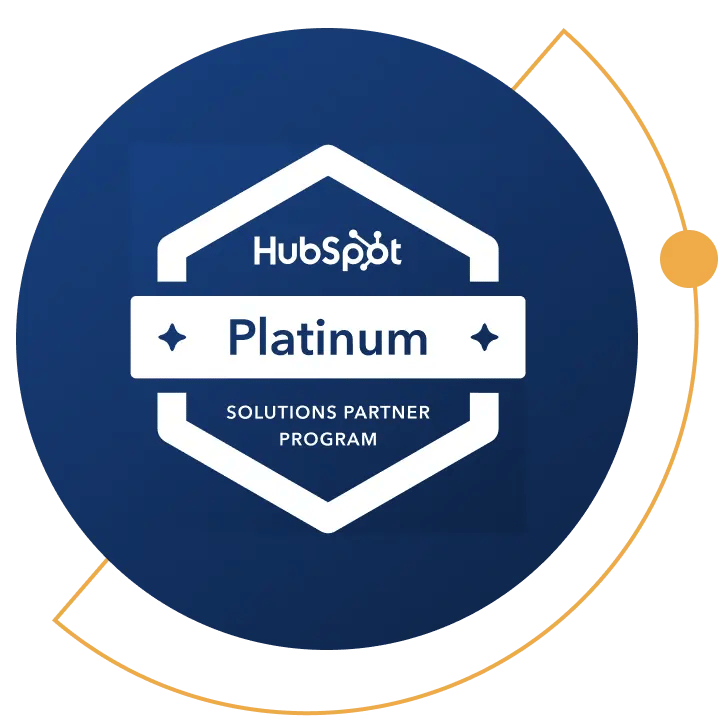HubSpot Portal Audit: Guide for Administrators
Your HubSpot portal is a critical component of your marketing and sales operations, but, like any complex system, it requires regular maintenance to ensure peak performance.
That's where a HubSpot portal audit comes in. This systematic review of your account identifies areas for improvement, streamlines processes, and maximizes the effectiveness of your efforts. With a step-by-step HubSpot audit, you can uncover hidden opportunities and address pain points unique to your organization.
In this article, we’ll break down everything HubSpot administrators need to know about conducting a HubSpot audit, so you can be sure to optimize your HubSpot processes for maximum efficiency and growth.
What is a HubSpot Audit?
A HubSpot audit is a comprehensive assessment of how your HubSpot portal is functioning, aimed at identifying areas of improvement and potential for process optimization. This evaluation involves a meticulous review of your HubSpot settings, processes, and data to ensure they align with your business goals, allowing your HubSpot account to be utilized to its fullest potential.
The HubSpot audit process typically includes the following key components:
- Marketing and Sales Automation Review: Examination of the automation workflows to ensure they are efficient and effective, aligning with your specific business objectives
- Content Audit: Thorough inspection of your blog posts, landing pages, and other content, including content performance analysis, helps identify opportunities for improvement
- Database Health Check: Assessment of your contact records for accuracy, consistency, and data quality, as well as identifying any data gaps
- Integration Review: Review of integrations, including native and custom integrations, between HubSpot and other tools
- Reporting Analysis: Assessment of the accuracy and relevance of your reports and metrics to measure success and shape your future strategy
The aim of a HubSpot audit is not just to rectify errors, but to uncover opportunities that will help your business grow and succeed. It allows you to take control of your HubSpot portal, ensuring that your marketing and sales efforts are as effective as possible.
By identifying and addressing any discrepancies or gaps in your HubSpot account, you can make data-driven decisions that will improve your processes and, ultimately, your results.
Remember, your HubSpot portal isn't just a tool—it's a partner in your success. Regular portal audits ensure that this partner is working in sync with your goals and delivering the best possible outcomes.
Why Does Your Organization Need a HubSpot Audit?
It can be hard to know when to conduct a HubSpot audit, because the need for an audit is driven by an organization’s growth and ongoing development plans. The precipitating need for an audit should be the desire to optimize performance and achieve documented success.

Over time, as business strategies evolve, your HubSpot portal and its processes need to also adapt to align with these changes. The natural evolution of your HubSpot portal can often lead to complexity, inefficiency, or even redundancy in your workflows or settings, which should be addressed by a proper audit.
The crucial pillars of strong HubSpot audit include:
- Data: Accurate, quality data is essential for the successful use of your CRM and HubSpot portal. A thorough audit can help identify and address any data-related issues, ensuring the accuracy and reliability of your data.
- Automation: HubSpot audits are often performed when particularly complex internal or external automation is not working as intended. An audit can uncover any bottlenecks or issues in your automation processes and help optimize them for better efficiency.
- Maintenance: HubSpot is a living database with multiple data inputs and integrations, making regular cleaning and maintenance essential. A HubSpot portal audit can identify outdated information, streamline workflows, and optimize your settings for better performance.
By conducting a comprehensive HubSpot audit, you can uncover hidden opportunities and address any challenges that may hinder your operations. The step-by-step audit process allows you to take command of your HubSpot portal, allowing you to make data-driven decisions that align with your business goals.
With a tailored and optimized HubSpot portal, you can achieve tangible business growth and witness the power of dynamic, client-centric solutions.
Conducting a HubSpot Audit: In-House vs. Partner-Assisted
As a HubSpot administrator, you’re likely tasked with the decision of whether to conduct your HubSpot audit internally or to consult an experienced HubSpot partner such as Vaulted, and that decision can make a significant impact on the future of your account. Let's weigh the pros and cons of each approach.
Internal HubSpot Audits
By performing the audit in-house, your team can have complete control over the process. Your team, being intimately familiar with your business, is well-acquainted with the specific requirements and challenges of your processes, and they can be assisted by following a step-by-step HubSpot audit checklist.
However, internal audits come with a few potential pitfalls:
- Time and Resources: Conducting an audit is time-consuming and requires specific expertise. Your team may need to put their regular tasks on hold to focus on the audit.
- Lack of Fresh Perspective: Being closely associated with the system, your team might overlook certain inefficiencies or issues, missing out on opportunities to enhance performance.
- Limited Knowledge: HubSpot is a complex tool with seemingly endless functionalities and regular updates. Unless your team members are committed to staying up-to-date as HubSpot experts, they might not be able to leverage the platform’s full potential.
Internal HubSpot audits are great tools to incorporate as part of regular process reviews, giving you insight into any major issues or opportunities available to your account. By following a HubSpot audit checklist, your team members can get better insight into how your account is currently performing.
Partner-Assisted HubSpot Audits
On the other hand, hiring a HubSpot partner like Vaulted to conduct a HubSpot audit carries its own advantages, including:
- Expertise: Certified HubSpot Partners are experts in the platform, with in-depth understanding and experience in conducting thorough audits. They can uncover hidden opportunities and address pain points that may go unnoticed by internal teams.
- Fresh Perspective: An external partner brings a fresh set of eyes to your HubSpot portal. They can provide unbiased insights and recommendations based on best practices and industry benchmarks.
- Time Savings: Partner-assisted audits save your team's time and allow them to focus on their core responsibilities.
- Data-Driven Approach: Partners like Vaulted take a data-driven approach, ensuring transparency and measurability in their solutions. You can be sure to get measurable results by working with a Certified HubSpot Partner.
As a HubSpot administrator, you’ve likely already considered a few of these points, so it would be important to carefully evaluate the advantages of each approach in relation to the specific requirements and capabilities of your organization.

While partner-assisted HubSpot audits offer numerous benefits, organizations often consider one potential downside: cost. Engaging a Certified HubSpot Partner does entail a financial investment, although most agencies will provide an initial quote for the audit at no cost. Additionally, some agencies provide HubSpot audit checklists
However, it's crucial to evaluate this cost in relation to the value and tangible results these experts bring—optimized processes, efficient workflows, improved data quality, and ultimately, enhanced business performance. View this as an investment into your organization's growth and success rather than a line-item expense.
The Importance of Regular HubSpot Audits
Regular HubSpot audits play a crucial role in maintaining data accuracy, optimizing workflows, and aligning with evolving business requirements. Regardless of the size of your account or the availability of administrators, it is highly recommended to conduct comprehensive audits on an annual basis. Additionally, implementing ongoing mini-audits at regular intervals can provide continuous improvements.
For organizations without dedicated HubSpot administrators, the significance of audits becomes even more pronounced. With limited administrative support, it becomes imperative to leverage audits as a means to ensure the health and effectiveness of your HubSpot portal. By proactively identifying and addressing potential issues, you can maximize the value and impact of your HubSpot account, even without dedicated administrators.
Incorporating New HubSpot Features
HubSpot audits also provide the opportunity to incorporate new or updated HubSpot features. One of the biggest benefits of using HubSpot as a CRM is the platform’s commitment to continual improvement and development, with new and improved features being regularly released. A HubSpot audit can help you identify which features will work well with the current operations you have in place.

For example, HubSpot released the beta version of its AI Assistant this past fall. The AI Assistant can help with generating new content and social captions, which could be a great fit for those HubSpot administrators who are struggling to keep up with regular content creation.
Remember, regular portal audits not only keep your HubSpot portal in top condition but also equip you with the insights and optimizations needed to drive results when you need them most. Make HubSpot audits an integral part of your strategy and unlock the full potential of your account.
Tailoring the Audit to Your HubSpot Hubs
A strong HubSpot portal audit will be tailored to your account’s unique setup, as most businesses use a combination of the different HubSpot products, known as Hubs. The HubSpot Hubs include:
- Marketing Hub®
- Sales Hub®
- Service Hub®
- Content Hub®
- Operations Hub®
- Commerce Hub™
Let’s break down the basics of a portal audit for the most commonly used HubSpot Hubs: Marketing, Sales, Service, and Content Hub.
HubSpot Marketing Hub® Audit
HubSpot Marketing Hub® users may face challenges related to lead generation, email marketing automation, and campaign performance tracking. A tailored HubSpot audit for the Marketing Hub® will focus on evaluating how easily your prospects can move through the buyer’s journey and how successful your marketing efforts are.
While your audit should be tailored to your specific needs, some aspects of a HubSpot Marketing Hub® audit checklist may include:
- Create and implement buyer personas for effective segmentation and personalization
- Analyze email deliverability and successfulness
- Identify opportunities for new workflows
- Test and optimize lead capture forms
- Enhance current email workflows by evaluating performance
- Implement advanced reporting and analytics to measure website traffic and campaign success
- Consider areas to implement A/B testing, such as CTAs and subject lines
- Utilize the lead scoring system effectively
- Update topic cluster tool to identify SEO opportunities
- Clean contact database by removing outdated information, merging duplicate contacts, and organizing properties and tags
- Examine sales team actions, identifying potential areas of improvement
- Break down your deals pipeline step-by-step to evaluate performance
- Check on the operation of any automation and sequences
- Implement reporting and analytics based on the goals and needs of your sales team members
HubSpot Sales Hub® Audit
For users with HubSpot Sales Hub®, pain points may involve deal pipeline management, contact segmentation, and sales email templates. During a customized HubSpot portal audit, we will carefully analyze these areas and provide recommendations to improve your sales process and better support your sales team.
A HubSpot audit that focuses on the Sales Hub® will likely include some of the following steps:
- Reviewing deal stages and pipelines
- Auditing custom fields on deals
- Evaluating and monitoring sequence performance
- Reviewing core sales features like Target Accounts and Forecasting
HubSpot Service Hub® Audit
The HubSpot Service Hub® can help you provide exceptional customer service through flexible channels, without overloading your team with hefty workloads. If there are flaws in your Service Hub®, though, you could be letting down your customers and failing to provide the best possible service to them. A thorough portal audit can help avoid this scenario.
A typical HubSpot audit of the Service Hub® may include tasks like:
- Evaluate your ticketing process for maximum efficiency
- Test ticketing routing and automation rules
- Organize and update Knowledge Base articles
- Thoroughly examine customer feedback and share with appropriate stakeholders
- Implement new customer feedback processes where appropriate
HubSpot Content Hub® Audit
The Content Hub allows you to easily build and manage your website and its content with easy optimization to maximize organic traffic and user conversion. Like with any website, regular audits can uncover any potential problems or missed opportunities.
An audit of your Content Hub may include the following steps:
- Ensure consistency in design and branding
- Connect to Google Search Console for maximum insight
- Review crawling and indexing for any potential errors
- Identify opportunities for personalization
- Check that all tracking and integration tools are working properly
- Review SEO recommendations to attempt to improve organic search rankings
- Implement comprehensive reporting to monitor the ongoing performance of your website
How to Get Started with a HubSpot Audit
It's important to note that organizations often prioritize specific features of HubSpot while neglecting others. During our HubSpot audit process, we will consider your organization's unique business patterns and address both the identified pain points and any untapped potential within your HubSpot portal.
While your industry doesn't directly impact the audit process, the specific HubSpot products your organization uses certainly do. For example, accounts like Sales Hub Professional or Marketing Hub Professional, commonly used by medium-sized organizations, may present fewer complications during the audit process, thus requiring a simpler HubSpot audit checklist.
However, the size and complexity of the account can significantly influence the audit process. Large, enterprise-level accounts, with their multitude of complex data points and workflows, require a more extensive portal audit.

Ready to Maximize Your HubSpot ROI?
Ensure your HubSpot portal is performing at its best. Identify growth opportunities, resolve hidden inefficiencies, and set your team up for sustained success with an expert audit by Vaulted, your Platinum HubSpot Partner.
If you have 300 workflows, for instance, you’ll want to set up a HubSpot audit checklist to ensure that you review them periodically. We recommend managing these audit checklists in batches or waves to maintain efficiency without feeling overwhelmed. Regardless of complexity, at Vaulted, we are committed to adapting our audit approach to your unique needs, ensuring thoroughness and accuracy.
7 Common HubSpot Mistakes Found by Audits
In our experience at Vaulted, certain situations commonly arise during a HubSpot portal audit. Here's a closer look at these areas and how we address them.
1. Deleted Users
Cleaning up deleted users is a frequently overlooked task, but it's crucial for maintaining data hygiene and ensuring the accuracy of your account.

By effectively managing users, you can ensure that your account only includes relevant and active users, improving overall data quality and account performance.
2. Static Lists
Deleting static lists is often overlooked, despite its crucial role in maintaining data hygiene and ensuring account accuracy. Since static lists are often single-use, effectively managing them guarantees that your account only contains relevant and active lists. This not only enhances data quality but also optimizes account performance. HubSpot administrators must keep a close eye on static list deletion for effective list management and overall account maintenance.
3. List Creation Process
As a HubSpot administrator, you likely manage or delegate HubSpot list creation and the types of lists that are created. As standard operating procedure, your HubSpot lists should be well-organized, categorized in labeled folders, and aligned to efficient list management practices.
4. Workflow Management
HubSpot workflows serve as incredibly effective automation tools that can significantly streamline operations. However, without proper organization and management, these workflows have the potential to become overwhelming to even the most experienced HubSpot administrator.

Dealing with workflows that encompass various objects, data copying, and conditions for unenrollment and reenrollment can present complex considerations for HubSpot administration.
5. Custom Properties
Custom properties capture unique data specific to your business, aligning with reporting and segmentation needs. HubSpot custom fields offer a specialized approach to data collection, addressing attribution and identifying lead sources.
However, an overabundance of fields can cause confusion and obscure vital information. A thorough HubSpot audit will allow you to review your custom fields, simplify, and streamline for clarity.
6. Data Quality
Clean and accurate data is the cornerstone of effective marketing and sales operations. A HubSpot audit can help identify any data quality issues and establish robust processes to enhance data integrity, ensuring the success of your business.

For example, one common data quality issue in HubSpot is that of duplicate records. Duplicates can lead to confusion, miscommunication, and undermine your marketing or sales strategies. Implementing advanced deduplication strategies helps identify and resolve these issues. By consolidating and maintaining clean data, we enhance the integrity of your operations, establishing a solid foundation for data-driven decisions.
7. Lifecycle Stages
Lifecycle stages are fundamental components for organizations in HubSpot. They serve as a framework to describe the current position of contacts in their sales or marketing journey. By aligning your contacts with the most suitable lifecycle stages during a HubSpot audit, you can efficiently manage and optimize your processes. This enables you to tailor your approach based on the specific needs and behaviors of your contacts, allowing for more personalized and effective communication throughout their entire customer lifecycle.
Lifecycle stages hold significant value for both sales and marketing teams. Marketing teams using HubSpot frequently are charged with producing marketing qualified leads, while the sales team uses lifecycle stages to know when to engage with potential leads and for tracking the contacts they are working with.
Explore How a HubSpot Portal Audit Can Help Your Business
A HubSpot audit relieves organizational pain points and uncovers net new opportunities for optimized marketing and data-driven sales. After a successful HubSpot portal audit, you can gain confidence in your mission-critical business system for sales, marketing, and service by pinpointing areas for improvement and crafting customized solutions to optimize your HubSpot investment.
Do you think your HubSpot account needs an audit? Not sure? Start a conversation with Vaulted, a Certified HubSpot Partner. We’re here to help you reach new heights.

Unlock Your HubSpot’s Full Potential
Gain deeper insights and optimize your portal. Discover hidden opportunities, enhance performance, and accelerate growth with a personalized HubSpot audit by Vaulted, a Platinum HubSpot Partner.
Frequently Asked Questions
1. What is a HubSpot portal audit, and why is it important?
A HubSpot portal audit is a comprehensive assessment designed to evaluate how effectively your HubSpot portal supports your marketing, sales, and service operations. It involves thoroughly reviewing your automation workflows, content strategies, database accuracy, integrations, and reporting systems. This helps ensure your portal aligns with your business goals and maximizes the capabilities of your HubSpot investment.
Regular HubSpot audits are crucial because, over time, portals can become cluttered, inefficient, or misaligned due to evolving business strategies, neglected maintenance, or rapidly growing data. Conducting regular audits helps identify and rectify these issues, enhancing overall performance, ensuring reliable data quality, and uncovering hidden opportunities that drive growth.
2. How often should I perform a HubSpot portal audit?
We typically recommend conducting a full HubSpot portal audit at least every 12 months. However, organizations that engage regularly with a dedicated HubSpot partner often find they can extend this interval. Continuous support from a HubSpot partner acts like regular dental checkups—catching minor issues before they grow into larger, costly problems, thus minimizing the frequency and intensity of comprehensive audits.
3. Should I perform a HubSpot audit internally or partner with a certified agency?
Performing a HubSpot audit internally allows your team to leverage their deep familiarity with your organization’s unique processes and workflows. Organizations with a dedicated HubSpot specialist—someone who manages the platform exclusively without competing responsibilities—may successfully conduct comprehensive internal audits.
However, there is a clear distinction between internal expertise and the perspective provided by external HubSpot partners, such as Vaulted. A certified agency like Vaulted has personally reviewed and optimized hundreds of HubSpot accounts across diverse industries, offering a depth of experience, broader perspective, and knowledge of industry benchmarks that internal teams typically cannot match. Partner-assisted audits not only save your internal team's valuable time but also provide insights, recommendations, and best practices that reflect extensive real-world experience.
4. What areas of my HubSpot portal will be reviewed during an audit?
A comprehensive HubSpot portal audit typically includes detailed reviews of key functional areas such as:
-
Automation: Examining workflows, sequences, and automation rules to ensure efficiency and alignment with business goals.
-
Data Quality/Integrity: Evaluating accuracy, consistency, completeness, and reliability of contact and organizational data, along with strategies to maintain data hygiene.
-
Feature Usage: Analyzing whether your organization fully leverages HubSpot’s available features and identifying potential areas of improvement or underutilization.
-
Basic Usage of Default Fields: Assessing how default fields provided by HubSpot are being utilized, ensuring standardization and best-practice adherence.
-
Reporting: Reviewing reports, dashboards, and analytics for accuracy, relevance, and actionable insights that drive informed decision-making.
Additionally, an audit may include assessments of content strategies, integration effectiveness, lifecycle stage usage, deal pipelines, and overall system performance to provide comprehensive, actionable feedback for your organization’s success.
5. What are common issues discovered during a HubSpot audit, and why do these matter?
Common issues uncovered during a HubSpot portal audit often include problems like outdated or duplicate user accounts, unmanaged static lists, inefficient workflows, excessive or redundant custom fields, poor data quality, incorrect lifecycle stage assignments, and underutilized automation. While these issues may seem minor individually, collectively they significantly reduce operational efficiency, distort reporting accuracy, and compromise decision-making processes.
Addressing these issues proactively matters because each inefficiency or error represents potential missed revenue, wasted resources, or diminished customer experience. For instance, duplicate data or unmanaged static lists can result in confusing communications to prospects, while disorganized workflows may slow down sales cycles or marketing campaigns. Regular audits provide an opportunity to catch and fix these issues before they compound, ultimately protecting your organization’s reputation, efficiency, and bottom line.
6. How can a HubSpot audit help us leverage new features and platform updates?
HubSpot continually releases new and enhanced features designed to improve the efficiency, effectiveness, and versatility of your CRM, marketing, and sales operations. However, with regular responsibilities often overwhelming internal administrators, it’s common for organizations to miss these valuable updates or fail to fully utilize their potential.
A comprehensive HubSpot audit identifies exactly how and where new features can be integrated into your existing workflows, ensuring your organization stays ahead of industry trends and maximizes your investment. For example, during an audit, your HubSpot specialist or partner may identify opportunities to leverage HubSpot’s AI Assistant to accelerate content creation or social media engagement, or suggest integrating newly released reporting and analytics capabilities to better measure campaign ROI. Thus, audits not only correct existing issues but actively position your business to adopt valuable improvements and innovations as they become available.
7. Which HubSpot Hubs can be audited?
Audits can be conducted on all HubSpot Hubs, including the Marketing Hub®, Sales Hub®, Service Hub®, CMS Hub®, Operations Hub®, and Commerce Hub™. Each Hub offers specific functionalities tailored to different business needs, requiring customized audit approaches. For example, an audit of the Marketing Hub® focuses heavily on lead generation, email performance, and marketing automation effectiveness. In contrast, the Service Hub® audit evaluates customer support processes, ticketing systems, knowledge bases, and customer satisfaction.
Given that most organizations utilize a unique combination of multiple Hubs, the audit is tailored specifically to your organization's Hub configuration, ensuring that each individual Hub’s performance is optimized within your larger HubSpot ecosystem.
8. How does auditing my HubSpot Sales Hub improve performance?
Auditing your HubSpot Sales Hub involves examining multiple dimensions of your current sales performance and strategy, including deal pipeline structures, forecasting accuracy, sales automation workflows, sales content effectiveness, and how closely sales processes align with buyer journeys. However, a comprehensive Sales Hub audit goes beyond reviewing isolated elements—it integrates deeply with your broader Revenue Operations (RevOps) strategy, assessing how well your sales processes, technology, and data support the generation and acceleration of revenue.
By auditing the Sales Hub, you gain insights into which sales stages or strategies are most successful, where bottlenecks occur, and how your sales team can better leverage HubSpot features to accelerate revenue. Ultimately, a thorough Sales Hub audit enables more predictable forecasting, optimized sales processes, improved data visibility, and a cohesive approach across your revenue-generating teams, significantly enhancing your overall sales effectiveness and organizational profitability.
9. What can I expect after completing a HubSpot audit?
Post-audit, you'll receive insights and actionable recommendations that optimize processes, increase data accuracy, reduce redundancies, and position your business for measurable growth.
10. What is the next step if I’m interested in conducting a HubSpot audit?
If you're considering conducting a HubSpot audit, the best next step is to reach out directly to a trusted, Certified HubSpot Partner like Vaulted. Our team of dedicated HubSpot experts will work closely with you to understand your organization's specific goals, pain points, and opportunities for growth. At Vaulted, we have the hands-on experience of auditing and optimizing hundreds of HubSpot accounts across various industries, which enables us to rapidly identify opportunities for significant improvement.
By partnering with Vaulted, you’re ensuring your HubSpot portal is evaluated with precision, expertise, and actionable insights—enabling your organization to unlock its full potential. Reach out today and start a conversation to discover how Vaulted can drive measurable growth and optimize your investment in HubSpot.
Interested in a HubSpot Audit?
Search by Tags
Be the First to
Know Subscribe to Our Newsletter!
Discover More Insights

The Integration That Disrupted Marketing, and the Architecture That Restored Momentum
When VenturEd Solutions migrated to HubSpot, they expected clearer attribution, stronger lead flow, and better alignment with Salesforce. Instead, a difficult implementation left both systems crippled.

Using HubSpot Like a Flip Phone? A Development Agency Can Fix That
. You know that feeling when you buy a fancy new phone, but all you use it for is texting and the occasional phone call? That’s what it’s like for some businesses using HubSpot. They invest in the platform packed with powerful tools and end up using just a sliver of what it can actually do. They sign up, poke around a bit, maybe send a newsletter or two, but never really unlock its full potential.

 Melissa Hunsberger
Melissa Hunsberger
 Emily Davidson
Emily Davidson
